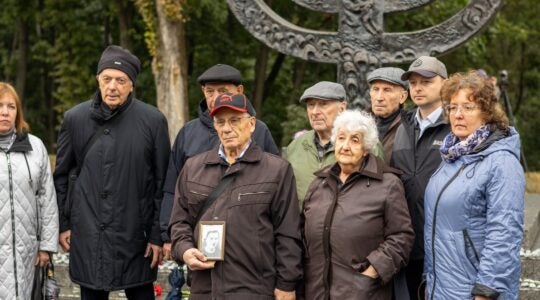BUENOS AIRES, Argentina (JTA) — Argentine Foreign Minister Hector Timerman visited the AMIA Jewish community center in Buenos Aires two months after his government recognized a unilateral Palestinian state.
Timerman, who is Jewish, met with Jewish community leaders Feb. 2 to tell them that the government is working to bring the AMIA bombers to justice. The 1994 attack killed 85 and wounded hundreds. He promised to seek cooperation from the countries he visits as foreign minister.
He also discussed the recent mass Latin American recognition of a unilaterally declared Palestinian state and the ongoing uprisings in the Middle East. The Jewish leaders and Timerman agreed that "democracy is the best way to solve conflicts" in the Middle East, especially in Egypt.
Timerman told AMIA leaders that he has accepted an invitation made by his Israeli counterpart, Avigdor Lieberman, to visit Israel and to help advance the peace process. He is scheduled to travel in the coming weeks to Jerusalem, and invited AMIA leaders to join him.
"My first reaction is to agree," AMIA President Guillermo Borger told JTA, "so I think that we would accompany him."
On Dec. 6, Timerman issued an official government statement recognizing a unilateral Palestine state, joining Brazil and triggering mass Latin American support for Palestinian Authority President Mahmoud Abbas. In response, Borger at the time expressed "concern over the recognition of a state which is not such, and cannot guarantee the security of Israel."
A month later in Brasilia, Timerman met with Abbas, and they issued a joint statement condemning terrorism and the AMIA attack.
Timerman is well known in the Jewish community for his previous career as a journalist and also as the son of newspaper editor Jacobo Timerman, who was kidnapped in 1970 by the military dictatorship and later released in 1979.
Forced into exile following his release, Jacobo Timerman moved his family to Israel, where he wrote and published two years later "Prisoner Without a Name, Cell Without a Number." A year later Jacobo Timerman published "The Longest War," a detailed and personal response to the first few months of Israel’s 1982 invasion of Lebanon.
JTA has documented Jewish history in real-time for over a century. Keep our journalism strong by joining us in supporting independent, award-winning reporting.





